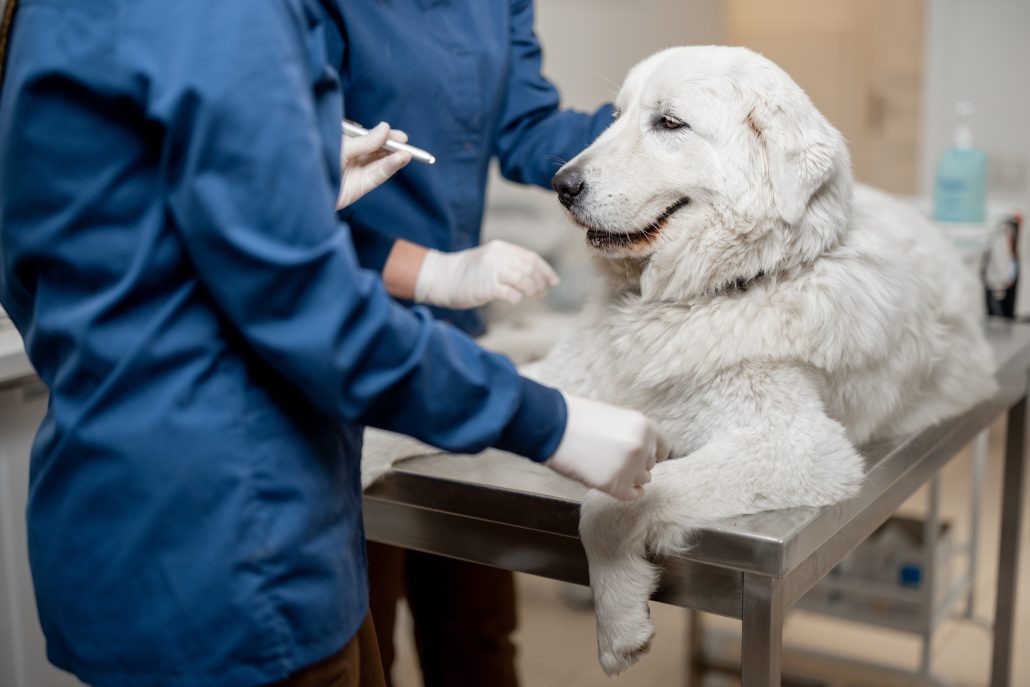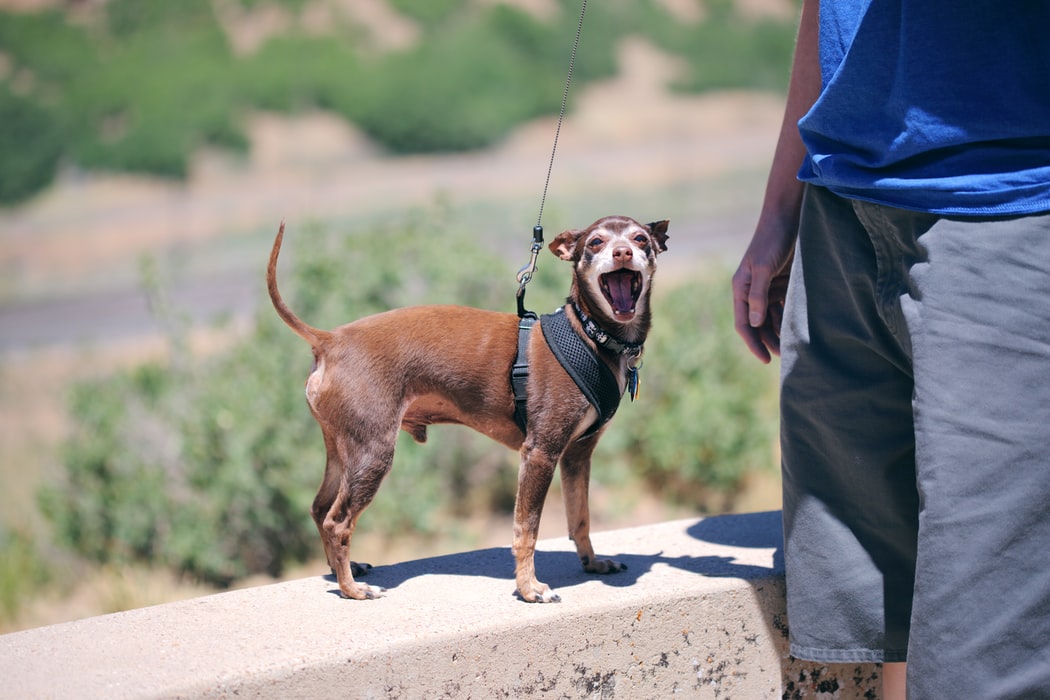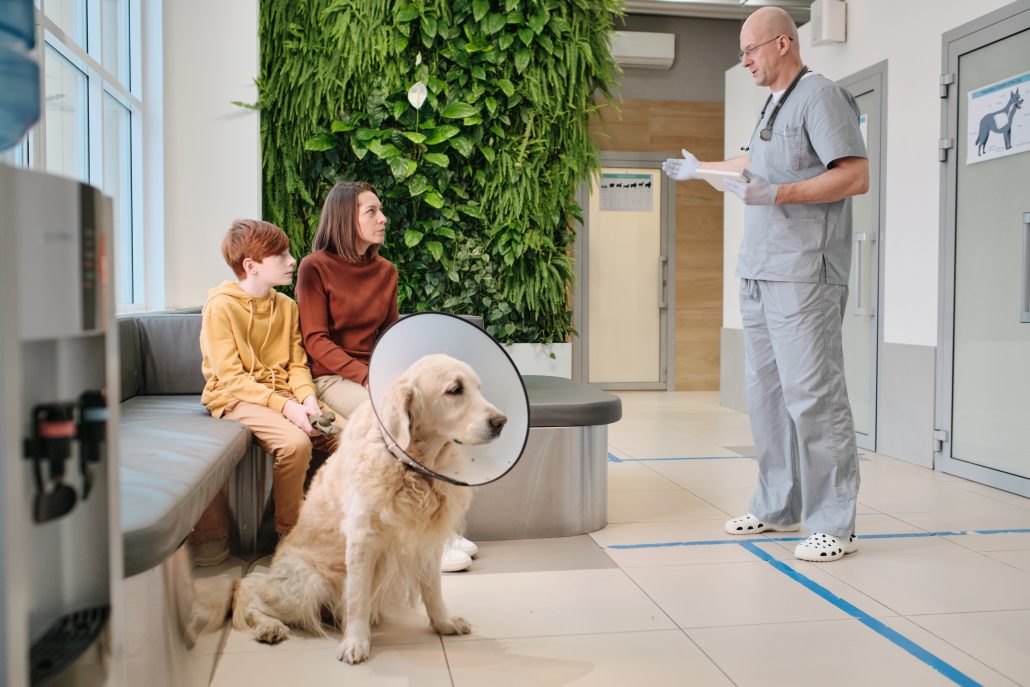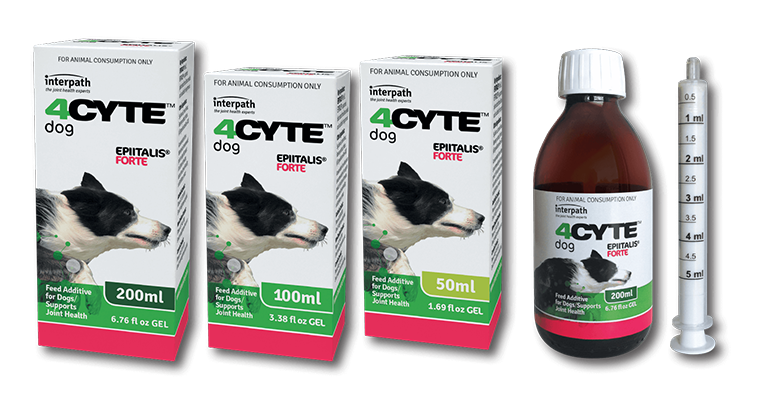As our furry friends age, their joints may start to feel stiff and they may struggle to get up and move around as easily as they used to. Degenerative joint disease (often known as Arthritis) is a common health issue affecting up to 20% of adults dogs in Australia.
Arthritis refers to inflammation in the joints and can cause pain, discomfort, and stiffness, making it difficult for dogs to enjoy their usual activities. This condition can also affect dogs of any breed, size, or age, and can significantly impact their quality of life.
However, with the right knowledge and treatment, it’s possible to manage arthritis in dogs and help them stay happy, comfortable, and active. In this post, we’ll discuss everything you need to know about arthritis in dogs, including the signs, causes, and available treatments.

What is Arthritis in Dogs?
Joints are complex structures where the ends of two bones meet allowing your dog to enjoy a full range of movement. Inside the joint capsule, the ends of your dog’s bones are cushioned and protected by a thin layer of cartilage. This provides a smooth, friction-free surface that allows the joint to move freely.
However, over time, joint degeneration can be caused by a number of factors including age, trauma infection, weight gain, surgery and more. As the cartilage lining deteriorates and thins, there can be a build up of fluid and even bone growth as the body tries to protect against the increased friction.
This leads to inflammation of the joint, and your pet may experience pain and mobility issues that can significantly impact their quality of life.
Signs & Symptoms Of Arthritis In Dogs
Signs of osteoarthritis, or degenerative joint disease, in dogs can vary depending on the severity of the condition and which joints are affected. However, some common signs to look out for include:
- Difficulty standing, sitting or lying down
- Limping or walking stiffly
- Lameness in one or more legs
- Reluctance to go up and down steps
- Reluctance to jump up or down furniture
- Reluctance to be touched
- Loss of stamina
- Unexpected aggression

If you notice any of these signs, it’s important to take your dog to a veterinarian for a proper diagnosis and treatment plan. Early detection and treatment can help manage arthritis in dogs and improve their quality of life.
Treating Arthritis & Degenerative Joint Disease
There are various treatment options available for dogs with arthritis, including medical and surgical approaches. Medical care for arthritis in dogs typically involves weight loss (if necessary), gentle exercise on soft surfaces, and warm compresses on affected joints to help ease pain and stiffness.
Non-steroidal anti-inflammatory drugs can also be used to minimise pain and inflammation,. However this approach should be taken with caution as long-term use of these medications can lead to gastrointestinal complications such as loss of appetite, vomiting, and inflammation of the stomach and intestines.
In severe cases of arthritis, surgical procedures may be necessary to alleviate pain and improve joint function. Joint replacements, such as full hip, elbow, or knee replacements, are among the surgical options that may be considered. Recovery following surgery will depend on the location and severity of the joint condition, as well as your dog’s overall health and age.
It is also important to follow your veterinarian’s post-operative care instructions, which may include physical therapy and a restricted activity level, to ensure the best possible outcome for your pet.
Your veterinarian will assess your dog’s symptoms, age, and overall health to determine the most appropriate treatment plan.
Managing Arthiritis
Unfortunately, arthritis is a chronic condition that can’t be cured. The goal of treatment is to control pain and manage inflammation in the joints. With proper management, the progression of arthritis can be slowed down. To help manage inflammation in the joints, The House Call Vets recommends a focused treatment plan. This may include a combination of :

Weight Control
Proper weight management is crucial in managing arthritis symptoms and slowing down the progression of the disease. Extra weight puts pressure on the already affected joints, so a low-calorie diet along with gentle exercise is recommended to maintain an ideal body weight.
Omega fatty acids can also help block inflammation and subdue the activity of enzymes that cause cartilage damage, thus slowing down arthritis progression.
Regular Gentle Exercise
Walking and swimming are great exercise options for dogs with arthritis.
It’s important to assess your dog’s ability to exercise on a case-by-case basis, as the level of exercise they can handle will vary depending on the severity of their arthritis.
Short bursts of exercise are typically recommended to avoid overexertion and excessive stress on the joints.


Regular Vet Care
Consulting a veterinarian is crucial when managing arthritis in dogs. Arthritis is a complex disease that requires a multifaceted approach to treatment.
Vets can provide a thorough examination via x-rays of your dog’s joints and prescribe a tailored treatment plan to manage pain and inflammation.
They can also monitor your dog’s progress and adjust the treatment plan as needed. Additionally, vets can provide guidance on weight management, exercise routines, and the use of supplements or medications to slow the progression of the disease.

A Comfortable Bed
An orthopedic pet bed made of memory foam can help protect the joints and bones of your pet. Providing a supporting bed is also very necessary for thin dogs, whose bones would otherwise rub on hard surfaces.
Some pet shops offer beds that are specifically designed for pets with arthritis, which can further enhance their comfort and reduce pain.


Mount Ramps And Slip-free Flooring
Senior pets and dogs with stiff joints often have difficulty navigating stairs, hardwood floors, and tile floors.
Ramps and pet stairs can be used to help your pet climb stairs and get up or down from the sofas. Additionally, placing rugs or carpets on slippery surfaces can help provide more traction and stability for your pet, making them less prone to slips and falls.
Pet Massage
Massaging your dog with arthiritis can be beneficial in improving their mobility, endurance, and blood circulation, while also promoting relaxation.
To avoid causing pain, it’s important to gently knead your pet’s stiff muscles, avoiding direct pressure on their joints.
Consider consulting with a licensed pet massage therapist to ensure safe and effective techniques.


Concentrate on grooming
Pets with arthritis may have difficulty cleaning themselves, especially in hard-to-reach areas. As a result, older pets require more frequent care than your younger companions.
Daily grooming, including gentle hair cleaning to remove mats and tangles, is recommended to keep your pet clean and comfortable.
Pain Relief Medication
In some cases, pain relief medication will need to be prescribed after diagnosis of flare-ups. However, it is best to only use these medications when needed. Some pets may require these medications for a longer period of time, in combination with their ongoing arthritis management program consisting of arthritis injections, lifestyle adjustments, and dietary supplements.
4CYTE “The new Superpower in Joint Health”
4CYTE Epiitalis Forte Dog is a premium daily feed supplement targeting pathological pathways associated with acute joint injury and arthritis. Epiitalis is an exclusive active ingredient patented for its revolutionary cartilage repair, pain relief and anti-inflammatory properties.
Research shows that Epiitalis stimulates healthy cartilage production and repairs damaged joints affected by age, injury and arthritis. 4CYTE supresses any anti-inflammatory chemicals responsible for poor joint function and pain.
4CYTE Granules or 4CYTE Epiitalis Forte Gel?
Epiitalis Forte Dog Gel contains double the volume of Epiitalis per daily dose. The gel formula is recommended for pre/post Orthopaedic surgery and dogs with moderate to severe Osteoarthritis. The gel is also an excellent option for dogs with seafood allergies.
4CYTE Canine Granules contains the active ingredient Epiitalis, along with Green Lipped Mussel, Abalone and Marine Cartilage. 4CYTE Canine Granules are excellent for the possible prevention of Osteoarthritis in dogs that might be predisposed to Osteoarthritis, for eg. – Working or sporting dogs.

Improve Your Pet's Quality of Life
Arthritis is a common problem among dogs, and recognizing the signs early can make a significant difference in managing the condition. Fortunately, there are several treatments available to help manage arthritis in dogs, including medication, supplements, exercise, and lifestyle changes.
It is crucial to consult with a veterinarian to develop a comprehensive arthritis management plan for your dog. The House Call Vet are a team of passionate professional who is dedicated to treating your arthritic dog. Whether you are looking for at-home consultations or in-clinic care, we can help improve your dog’s quality of life and reduce the impact of arthritis on their daily activities.

